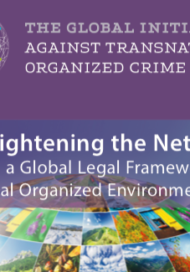Posted on 14 Apr 2015
At a side event to the UN Crime Congress currently ongoing in Doha, The Global Initiative against Transnational Organized Crime and the WWF presented a new report entitled “Tightening the Net: Towards a Global Legal Framework on Transnational Organized Environmental Crime.” The report reviews major gaps and the obstacles in the global legal architecture that stand in the way of the global response to transnational organized environmental crime.
Panelists from TRAFFIC, the Environmental Investigation Agency (EIA) and the Black Fish provided evidence-based presentations demonstrating the level of transnational organized criminality in the environmental sector. These forms of enterprise crimes – whether perpetuated by criminal networks as a business or by business as a criminal practice – are undermining the international, regional and domestic regulatory frameworks and response mechanisms designed to ensure sustainability of terrestrial and marine environments. These are two of the proposed goals in the new post-2015 Sustainable Development agenda, which was the key theme of this UN Congress.
The growing attention that is being paid to the trafficking of certain wildlife species is not being extended to other forms of environmental crime, such as fisheries crime, and the trafficking of ozone depleting substances and e-waste, despite the significant harms they cause. Furthermore, such discourse and understanding is arguably not translating into demonstrable successes in preventing continued criminality and the associated negative consequences for social and economic development, good governance, human rights and the rule of law.
The WWF and Global Initiative study found that there is currently no overarching legal instrument that encompasses these diverse crime types under a single criminal law framework. This provides little scope for international intervention in cases where capacity or political will is lacking, or where states are actively non-compliant.
Presenting a global legal review, this report analyses the international legal frameworks currently available to combat transnational organized environmental crime, and explores potential ways to strengthen the current situation. Indeed, extant legal tools appear as a loose net of international, national and local laws that often fail to work together efficiently. Inconsistencies and remaining loopholes create havens for organized criminal groups and transit hubs for their illicit activities.
The main legal weakness is the fact that international treaties still fail to address environmental crime as a form of transnational organized crime. Instead, they either focus on conservation or international trade aspects.
The analysis highlights that the only global treaty that could provide the needed criminal perspective is the UN Convention against Transnational Organized Crime (UNTOC). However, many forms of environmental crime fall outside its scope because its application relies on national laws.
Indeed, UNTOC is only applicable if national laws reach the UNTOC application threshold (which is the establishment by national laws of a maximum criminal penalty of at least four years of imprisonment) otherwise it is not applicable. Unfortunately many countries do not yet criminalize the activities that constitute forms of transnational organized environmental crime, they often prohibit them as illegal or unlawful but it is not the same as legally defining them as criminal.
In addition, where the criminal approach does exist, the UNTOC application threshold is not always reached. These observations are a starting point for a much needed discussion on the potential improvement of global legal frameworks. This report also raises the possibility of a new international legal framework dedicated to transnational organized environmental crime.
One of the conclusions consistent across presentations and the report, is that responses are fragmented and sectorally-siloed. This patchwork approach has prevented the learning of lessons and the design of coherent and robust responses.
The discussion at the side event, with participants from Member States, inter-governmental representatives, and civil society, found common ground in recognizing the seriousness of the problem and the need for action. At the same time, the conversation highlighted the need for constructive engagement with a broad base of relevant actors, continued awareness raising with consumers, incorporating principles of corporate social responsibility, which together should culminate in future action that is proportionate and allows for sustainable industries.
The Global Initiative, WWF, the Black Fish, EIA and TRAFFIC encourage Member States and the Congress to invest in greater intelligence-led enforcement and monitoring; and to consider avenues for an open, cross-sectoral dialogue process to generate possible options for a global legal response to transnational organized environmental crime.




